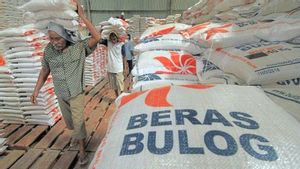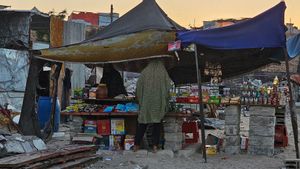JAKARTA - Economist and Director of the Center of Economics and Law Studies (Celios) Bhima Yudhistira said that domestic food production must be strengthened to anticipate the impact of war conflicts in the Middle East.
"I encourage the government to suppress imports of food goods and consumer goods. The suggestion is to protect the real sector (important) from the impact of conflict in the Middle East," Bhima said in a statement in Jakarta, quoted from Antara, Thursday, April 18.
According to Bhima, the cause of the weakening of the rupiah exchange rate against the United States (US) dollar was not only the Iran-Israeli war, but also the weakening of import regulations.
" Imported goods ranging from 3 million tons of rice, garlic to the opening of imports of goods through e-Commerce have weakened the real sector and the rupiah at once," said Bhima.
Bhima also said that there must be concrete steps taken by policy makers in limiting imports.
"The effectiveness is to tighten imports and strengthen domestic production," said Bhima.
Separately, economist from the Center of Reform on Economic (Core) Mohammad Faisal said the fiscal and monetary policies issued by the government must be more accommodative and responsive, in order to keep people's purchasing power from falling due to global influence, in this case, war in the Middle East region.
"Fiscals must be more accommodative, from a monetary perspective, you must pay attention to things that hinder the real sector," said Faisal.
According to Faisal, the thing that needs to be anticipated is the increase in oil prices which can have an impact on rising fuel prices in the country.
SEE ALSO:
Fiscal policy must be looser, avoiding policies that suppress people's consumption and purchasing power. If you look at the escalation in the Middle East before the war, the fiscal policy is stricter, namely with VAT 12 percent excise and others, this must be avoided. Including restrictions on subsidies that must be avoided as well. Because of the anticipation of oil prices that will cause an increase in fuel prices," said Faisal.
From the monetary side, according to him, the government must pay attention to things that can hinder the real sector, especially the interest rate. The government does not need to follow if the Fed responds to geopolitical conditions in the Middle East by increasing interest rates.
"But we are looking for other ways. For example, if we don't raise interest rates, we will weaken the rupiah exchange rate. So to reduce the weakening, we can use the instrument to pour foreign exchange reserves. Because our foreign exchange reserves are also quite large," said Faisal.
The English, Chinese, Japanese, Arabic, and French versions are automatically generated by the AI. So there may still be inaccuracies in translating, please always see Indonesian as our main language. (system supported by DigitalSiber.id)
















